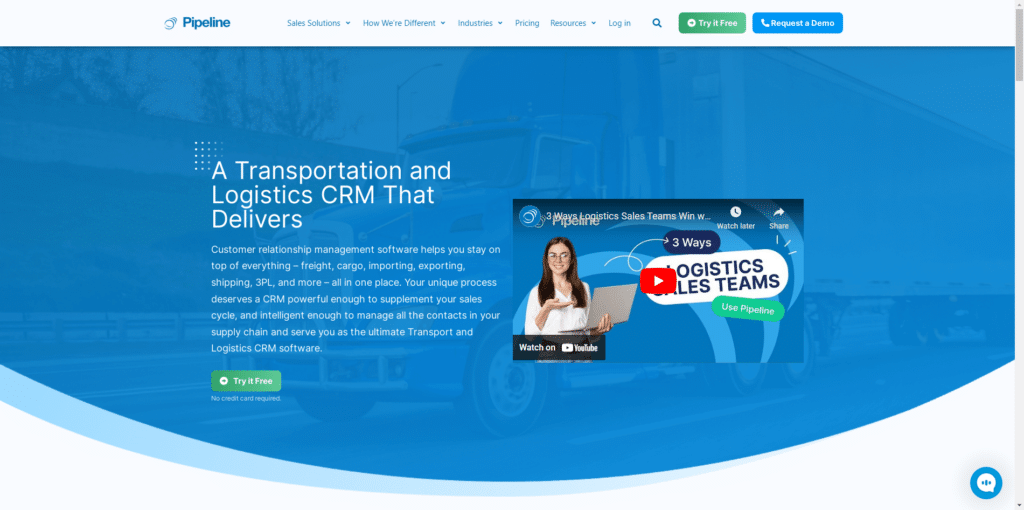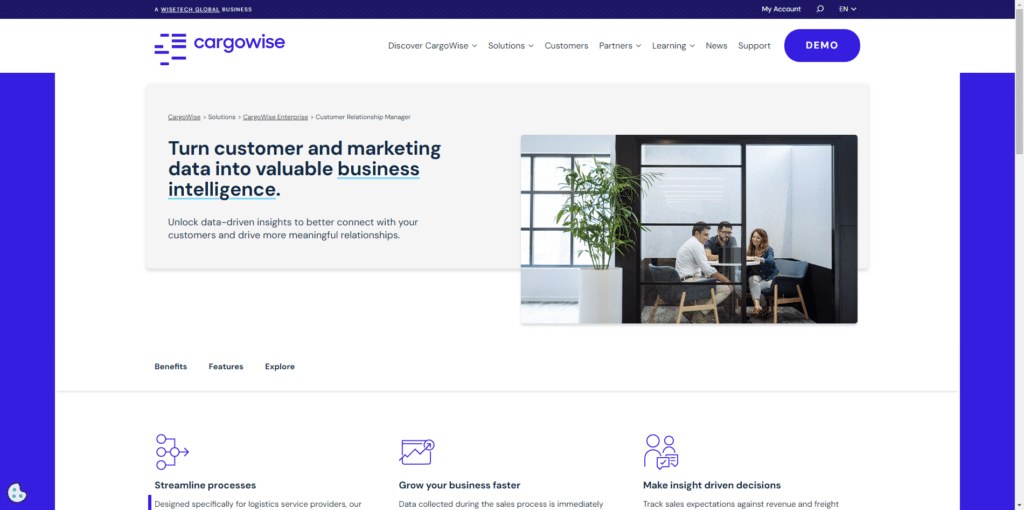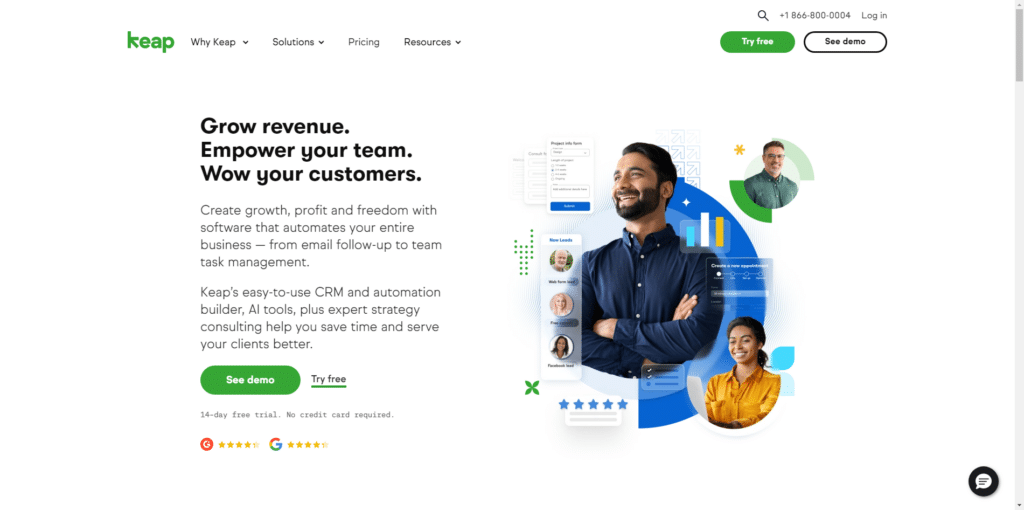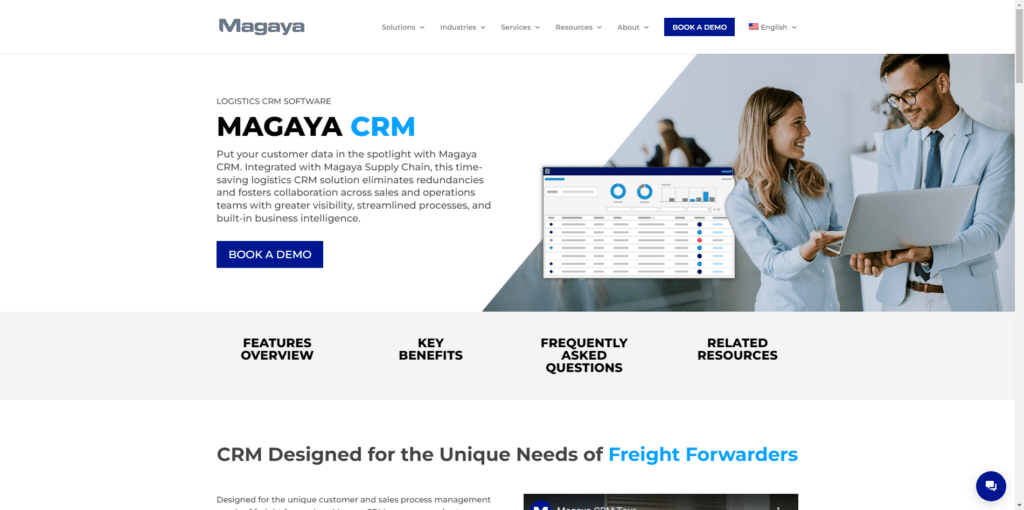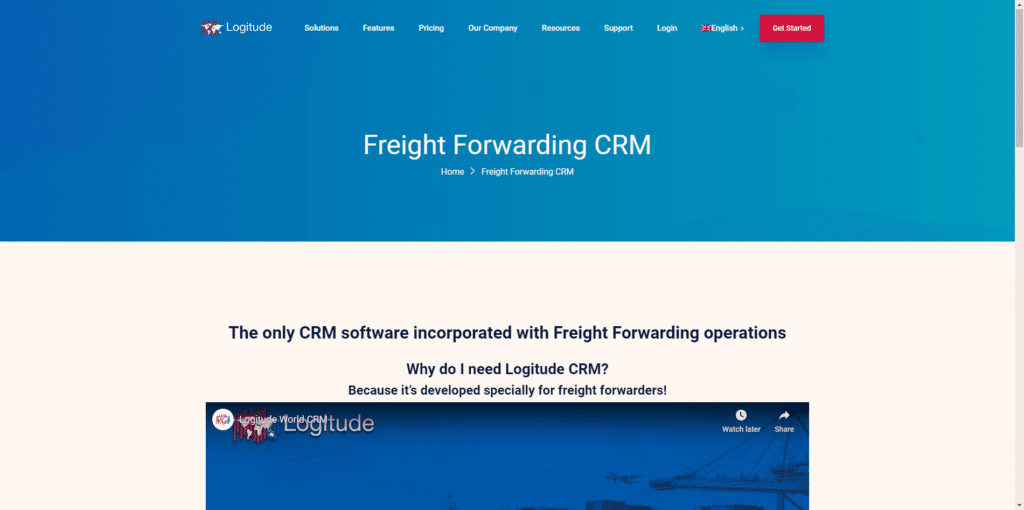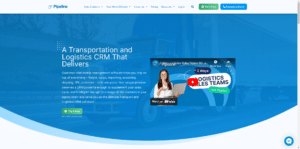Looking for CRM alternatives for logistics companies?
Pipedrive is a strong contender, but it’s not for everyone. Reviewers mentioned its limited (or missing) feature set, issues with integration, and high cost.
The good news is that some powerful logistics CRM software is on the market, making it a great Pipedrive CRM alternative for logistics companies. We’ll compare five logistics CRMs, looking at their features, pros and cons, reviews, and pricing. Keep reading to find which Pipedrive alternatives are the best for your logistics company.
Why do you need logistics CRM software?
It’s an uphill battle for logistics companies to generate sales. They struggle with a variety of factors that are much more difficult to overcome. The ongoing struggle against these challenges puts many logistics companies out of business.
Which factors are we talking about?
- Razor-thin margins: High operating costs—fuel, labor, and fleet maintenance erode profits—and supply chain disruptions.
- Service commoditization: Logistics are often treated as a commodity, like steel or lumber. This creates more downward pressure on already thin margins.
- No differentiation: It’s common for logistics companies to position themselves as the cheaper, faster, or easier option. This can work, but it’s typically a disaster for your margins since customers have no real reason to choose you over a competitor other than price, speed, or ease of use.
- Long sales cycles: Our industry relies heavily on strong, trusting relationships, which take time to build. Many organizations lack the tools or processes to build, nurture, and maintain these relationships.
While logistics CRMs can’t fix your margins, they can help you with the other three items. Let’s start the list of CRM alternatives for logistics companies with Pipeline CRM vs. Pipedrive.
1. Pipeline CRM: One of the Best Pipedrive Alternatives
Pipeline CRM is one of the best CRM software for logistics and excellent contender for Pipedrive CRM alternatives. This sales-driven CRM focuses on one thing: closing deals. They are perfect for organizations looking for an affordable and customizable option that can scale up or down with their business.
Besides its simple yet powerful sales management features, another factor that separates Pipeline CRM from its competitors is its world-class customer service. They offer best-in-class email and chat support, and they’re even willing to onboard and train your team. Other providers outsource onboarding, and some logistics CRM software limits their customer service to specific high-tier plans only.
Key Features of This Pipedrive Alternative
- Built-in email drip campaign and AI email writing assistant
- Smart agendas (automatically build to-dos as you work)
- Easy integrations with a large list of software and providers, including QuickBooks, CallRail, and Gravity Forms
- Sales forecasting and analytics
- Custom sales processes, including custom deal stages and custom fields
- Deal Insights (to identify the likelihood of success or failure)
Pros
- Pipeline CRM is scalable yet very affordable
- Heavily oriented toward selling with extensive sales management automation
- Best-in-class, industry-leading customer support
- Best for small-to-medium organizations
Cons
- Limited enterprise options
- No on-premise options
App Support
- Support: Email or live chat.
- Onboarding services: Personalized training and guidance to ensure a successful CRM implementation
- Knowledge base: Get started documents, FAQs, and troubleshooting guide.
- Status updates: Consistent service uptime across platforms
Reviews
- 4.4/5 star rating on G2 (928 reviews total)
- 4.4/5 star rating on Capterra (623 reviews total)
- 4.2/5 star rating via Gartner (41 reviews total)
Pricing
Pipeline CRM offers three paid plans. There’s also a free 14-day trial to test this Pipeline’s logistics CRM.
- Start plan: $29 per user per month
- Develop plan: $39 per user per month
- Grow plan: $59 per user per month
Go to the Pipeline CRM pricing page to learn the features of each plan.
2. CargoWise: A Sleek Pipedrive Alternative
The next on our list of Pipedrive CRM alternatives for logistics companies is CargoWise. CargoWise is a cloud-based CRM platform providing end-to-end support for logistics companies. They manage everything from global trade changes (e.g., increased taxes, regulation, and tariffs) to sudden spikes in ecommerce volumes.
If your logistics company handles intermodal transportation or you plan on expanding nationally or internationally, CargoWise CRM may be a good fit. They offer many solutions, such as forwarding, customs, warehouse, and carriers, among others.
Features
- Centralized database
- Opportunity and campaign manager
- Real-time performance analytics
- Track calls, meetings, and plans made with every customer
- Build detailed portfolios on key opportunities
Pros
- Great for enterprises
- It integrates with a large list of software and providers (e.g., Microsoft, Google Apps, Zapier, etc.).
- 24/7 international support
Cons
- High cost; pricing options often range from $500 to $10,000+ per month
- No on-premise options
App Support
- 24/7 support: help desk, chat, phone, or email
Reviews
- 2.9/5 star rating on Software Advice (32 reviews total)
- 2.8/5 star rating on Capterra (32 reviews total)
- 3.2/5 star rating via Gartner
Pricing
CargoWise doesn’t disclose its pricing. You need to contact them for a quote.
3. Keap
Previously Infusionsoft, Keap is another Pipedrive CRM alternative for logistics companies. Keap is an all-in-one sales and marketing automation solution for small and medium-sized businesses.
If you’re looking for a well-established CRM generalist, Keap is a great candidate. Keap helps you to create web forms, run fully automated campaigns, track ROI, follow up with customers, and even process payments. However, if you already have payment processing, landing pages, or other tools in place, getting your tools to cooperate with Keap may be a challenge.
Additionally, Keap works best if you’re willing to commit to the long term. While their product is mature, it seems to require extensive onboarding, training, and education.
Features
- Sales and marketing automation
- Payment processing
- Appointment setting
- Lead source attribution
Pros
- Automated follow-ups
- Close monitoring of leads through the sales and fulfillment lifecycle
- Highly customizable
- Robust reporting
Cons
- High cost
- Not user-friendly
- Portions of their platform are still outdated, causing inconsistent performance
App Support
- Support: email
- Documentation
Reviews
- 4.2/5 star rating on G2 (1,527 reviews total)
- 4.1/5 star rating via Capterra (1,271 reviews total)
- 8.2/10 score via TrustRadius (378)
Pricing
- Pro: $199 per month (2 users, 1,500 contacts)
- Max: $299 per month (3 users, 2,500 contacts)
- Ultimate: $359 per month (3 users, 2,500 contacts)
4. Magaya
Another CRM alternative for logistics companies is Magaya Supply Chain. Magaya is designed for freight forwarders, NVOCCs, customs brokers, warehouse operators, and logistics services providers. Their platform functions as a single source of truth managing operations, accounting, sales and marketing, tracking, and compliance.
One nice thing about their platform is that it’s usable right out of the box. It is loaded with hundreds of industry-specific document templates and freight-forwarding workflows for domestic and cross-border logistics. It also includes advanced WMS with eCommerce connections to major retailers and couriers. You can use them to automate and optimize your logistics business, with the ability to add more functions as your organization scales up.
If you’re consistently entering, re-entering, and updating customer details, quotes, and contracts across multiple platforms and tools, Magaya may be for you. According to their description, “Magaya automates the tedious and repetitive tasks that slow down shipments, waste time, cost money, and allow errors to slip in.”
Features
- Supply network coordination
- Automation of warehouse operations
- Manage leads, contacts, and accounts alongside relevant account data (e.g., quotes, interactions, data, etc.)
- Data sync between Magaya Supply Chain and Magaya CRM
- Create mass marketing campaigns, qualify and rank leads, and integrate with mail providers directly
Pros
- Provides end-to-end tracking across multiple applications
- Information is shared across all of Magaya’s services and products, so double entry isn’t an issue
- Centralized data management for warehouse, quotes, invoices, and operations
Cons
- Poor integrations
- Steep learning curve
- Issues with user rights and permissions (sharing data with the wrong people)
App Support
- Support: email and WhatsApp
- Help desk
Reviews
- 4.5/5 star rating on G2 (108 reviews total)
- 4.4/5 star rating on Capterra (46 reviews total)
- 9/10 score via TrustRadius
Pricing
You need to contact the Magaya team to ask for the tool price.
5. Logitude
The last of our Pipedrive CRM alternatives for logistics CRM is Logitude. While other end-to-end providers bundle their services together, Logitude doesn’t require customers to be freight forwarding users to use their logistics CRM. Their services are affordably priced with solo and small business logistics companies in mind.
Features
- Opportunity management
- Contact management
- Sales funnel overview
- Sales performance reporting
- Account permission settings
Pros
- Fast and effective quote creation process
- View and analyze customer performance via built-in CRM dashboards and reports
- File Outlook messages and attachments directly within the platform
Cons
- API is available at an additional cost
- Some systems are complex and difficult to use
App Support
- Support: contact or email
Reviews
- 4.5/5 star rating on Capterra (40 reviews total)
- 4.4/5 star rating on G2 (14 reviews total)
- 4.5/5 star rating via Software Advice (40 reviews total)
Pricing
- $35 per user per month
What to Consider When Choosing CRM Software for Logistics Companies
What specifically do logistics companies need from their CRM systems? Key features include:
- Scheduling: Your logistics CRM should provide custom scheduling options to optimize your collection and scheduling for first and third-party inventory and assets.
- Monitoring deal flow: Tracking prospects and customers through your sales and fulfillment pipelines is a must-have. This allows logistics companies to provide employees and customers with real-time, company-wide status updates.
- Integration with route optimization: Your logistics CRM must integrate with route planning software. When route optimization is disconnected from your CRM, streamlining deliveries, minimizing fuel costs, and improving efficiency become uphill battles.
- Integrating with inventory management: Can your inventory management tools automatically share your inventory levels and order notifications with your logistics CRM software? Having this feature keeps your sales, marketing, customer service, and accounting teams in the loop.
- Centralized communication: You’ll need a centralized logistics CRM tool to manage internal (e.g., milestones, deliverables, forecasting) and external (e.g., customer inquiries, reviews, and complaints) communication via a suite of tools. More importantly, you’ll need open internal and external communication channels.
- Performance analysis: Unlock hidden insights with historical data! Your logistics CRM reveals shipping patterns & trends, helping you optimize operations, identify bottlenecks, and seize growth opportunities.
- Mobility: Empower all teams (sales, marketing, support, fulfillment) with real-time access & mobile-first CRM. One platform, one truth.
- Scalability: The ability to scale up (and down), handle sudden spikes in activity, and accommodate a steady growth in demand over time without sacrificing performance or functionality.
- Integration capabilities: Integration with Enterprise Resource Planning (ERP) software, transportation management systems, and accounting software is ideal as this makes process automation smooth.
Related: What is ERP, and how does it differ from CRM? Find the answers here.
The Best Pipedrive CRM Alternative for Logistics Companies is Pipeline CRM
Pipedrive is a well-known option, but for a more affordable alternative with similar powerful features, consider Pipeline’s robust, customizable logistics CRM.
This powerful solution can help you better manage your sales pipelines, leverage sales automation solutions, and generate accurate sales reports to close more deals and streamline your operations. Like our happy logistics company clients, GlobalTranz achieved a 63% increase in partnerships with revenue-generating agents after using Pipeline CRM.
Try Pipeline CRM today, and experience a similar growth to your logistics company! Sign up for a 14-day free trial.
